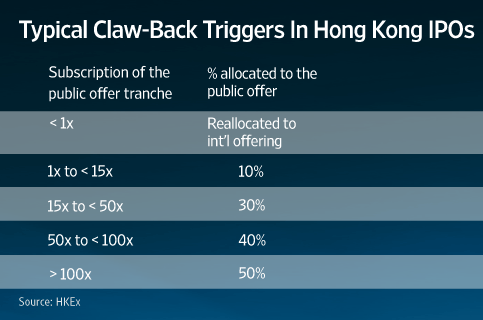HONG KONG (Dow Jones Investment Banker) – Despite all the hype and the almost weekly announcements of planned billion-dollar deals, retail investors in Hong Kong have largely shunned IPOs since the start of the year.
An analysis of public offer tranches for IPOs there shows that, apart from MGM China Holdings Ltd. and a handful of smaller deals, retail offerings have been lowly subscribed as far as the larger transactions are concerned.
At the same time, financial sponsors and private equity shareholders are now increasingly choosing the M&A option when going down the dual-track exit route – a clear sign that sentiment may have shifted for the worse and that the market could be suffering from acute IPO fatigue.
According to Dealogic and to the website of the Stock Exchange of Hong Kong (HKEx), out of the 23 IPOs in Hong Kong that have priced on the Main Board of the exchange in 2011, only nine generated sufficient retail demand to trigger a claw-back in favor of retail investors. Of these, only four achieved the maximum trigger of 50%, signifying that the retail portion of the IPO was more than 100 times subscribed. And in all cases bar one – the US$1.5 billion IPO of MGM China, where a 30% retail tranche was triggered – the global offerings for these nine IPOs were less than US$50 million in size, implying very small initial public offers that could be multiple times covered relatively easily.
In four other cases, demand generated by retail investors was actually insufficient to fully cover the initial tranche, and the shares had to be re-allocated to the international offering.
According to a 2010 report by Oliver Wyman, retail trading accounts for 29% of HKEx’s turnover, while retail investments represent 70% of assets under management in Hong Kong, the highest proportion in the Asia Pacific region, with the exception of Singapore.
So retail investors in Hong Kong are generally a good barometer of primary equity market sentiment. HKEx has also developed a unique “claw-back” mechanism to increase the size of a retail offering depending on its level of over-subscription. Typically the public tranche initially consists of 10% of the total deal, but the claw-backs can raise that to 50%.
There’s some measure of flexibility. These initial and final percentages can vary to ensure that more stock is offered initially in transactions that might have a particular appeal to the public. For example, the initial public offer tranche was set at 20% for the yuan-denominated Hui Xian REIT since it was thought (wrongly as it turned out) that this instrument would generate significant retail interest. Numbers can also be adjusted to avoid too large a tranche ending up in the hands of retail investors, which could lead to excessive volatility in the aftermarket. The US$10 billion dual-listed IPO of Glencore is a case in point, where 2.5% of the offering was initially reserved for the public in Hong Kong.

It remains to be seen whether the retail offer for Prada S.p.A.’s IPO will be successful, although initial indications – on the back of an international offering said to be already five times subscribed – are that this will probably be the case. The retail offer for Samsonite International S.A.’s US$1.25 billion IPO, however, was said to be only just covered, with investors apparently cautious given a relatively pricey valuation and the fact that the offering consisted mainly of shares held by private equity firm CVC Capital Partners and The Royal Bank of Scotland.
Lackluster investment sentiment has already led other financial sponsors to shelve their Hong Kong IPO plans. TowerBrook Capital Partners, the owners of high-end footwear Jimmy Choo, who were at some point eyeing a listing in Hong Kong for the brand, ended up selling it to privately-held luxury group Labelux Group GmbH from Switzerland. Similarly, Carlyle and Chairman Remo Ruffinihave decided – for now at least – to sell a 45% stake in Italian sportswear Moncler for US$611 million to Eurazeo SA rather than go down the Hong Kong IPO route.
Could it be that Hong Kong’s moms and pops might know best? As summer approaches, Mr. and Mrs. Wong – Hong Kong’s version of Mr. and Mrs. Smith – appear quite happy to sit it out.
(Philippe Espinasse worked as an investment banker in the U.S., Europe and Asia for more than 19 years and now writes and works as an independent consultant in Hong Kong. Visit his website at https://www.ipo-book.com. Readers should be aware that Philippe may own securities related to companies he writes about, may act as a consultant to companies he mentions and may know individuals cited in his articles. To comment on this column, please email [email protected]).
[This article was originally published on Dow Jones Investment Banker on 13 June 2011 and is reproduced with permission. It also appeared on WSJ.com, the website of The Wall Street Journal]
Copyright (c) 2011, Dow Jones & Company, Inc.
